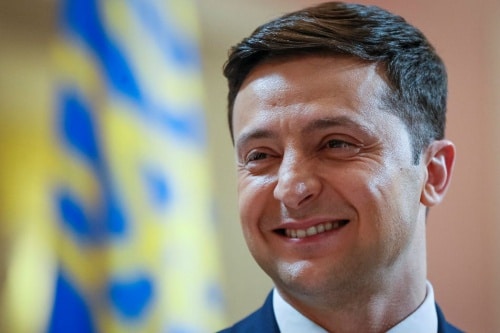On March 31 the first round of presidential elections was held in Ukraine. Comedian Volodymyr Zelensky enjoyed 30.23 percent of the votes so far, with the Central Election Commission (CEC) now having counted 99.88 percent of the votes. Incumbent President Petro Poroshenko was second with 15.95 percent, followed by Bativshchyna Party leader Yulia Tymoshenko with 13.38 percent. The elections can be seen as a test for Poroshenko’s political track-record, after he first came to power in 2014 on a wave of pro-Western anti-government protests.
Road to elections
In 2014, Poroshenko came to power when the pro-Russian president Viktor Yanukovich was ousted after the Maidan street protests. He was elected with 55 percent of the votes, conveying the image of him defending the country’s territorial unity, being a pro-European Union and NATO leader and as saviour of Ukraine’s Orthodox Church. He is frequently called the ‘Chocolate King’, as he owned the chocolate empire Roshen that made him, together with his news channel 5 Kanal TV, a billionaire. His supporters believe him to be the only guarantor of stability, security and sovereignty in a time of great conflict with Russia. However, the country is still plagued with corruption and it seems that the majority of Ukrainians is tired of the political system as it exists today. Poroshenko, while having achieved some modernisation notably in the army, is criticised for a lack of reforms, an inability to stop the war in the eastern Donbas region and the reduction of livings standards since the 2014 elections. Back then, a new democratic future was promised, putting a stop to the corrupt regime of the former ruler. Public opinion now turned against the government, which is being depicted as dishonest and unreliable. Only 9 percent of Ukrainian citizens have confidence in their ruler, a Gallup poll showed.
Candidates
Frontrunner Zelensky, 41 years old, is best known for his role in the political comedy series Servant of the People where he plays a teachers that becomes president of Ukraine through some extraordinary circumstances, and proceeds to fight corruption and shake up the political system. During his anti-establishment campaign he mocked his political rivals with jokes, sketches and other performances. Zelensky promised that, if elected, he will fight against corruption and for reforms. Moreover, he promised to address and implement peace talks for eastern Ukraine. He also wants to implement a new law on ‘People’s Rule’ in order to establish referendums where Ukrainians could express their expectations for the authorities. His campaign showed this principle of direct communication, where he asked his supporters to write his program with him to prevent him from making “false promises.” According to the polling organisation Rating Group, the majority of Zelensky’s supporters are young people, from 18-25 years old, situated in mostly southern and eastern regions. The voting for Zelensky by (a majority of) the public can be seen as a protest against the old leaders and general political establishment, overpowering the fact that he lacks political experience. Poroshenko said, after the first round, that these elections were a wake-up call for him and the “authorities as a whole” and “a reason to work on our mistakes”. He also addressed that he would like to restore Ukrainian sovereignty in the Donbas and Crimea regions through diplomatic talks.
Future
More than 35 million people were eligible to vote in the first round. The EU announced that it looks forward to a “free, fair and transparent” second round of elections on April 21. The first round was said to be “competitive” and “fundamental freedoms were respected”, according to the Organization for Security and Cooperation in Europe (OSCE). However, there was a lack of political debate, the coverage of campaigns seemed biased and vote-buying still occurred. For now, because none of the candidates secured 50 percent of the votes, a second round will take place on April 21. Poroshenko is still determined to take Zelensky head on in the runoff, stating there is “no time for jokes”. He declared Zelensky’s success to be the work of the “Kremlin agents”, calling Zelenski himself an “oligarch’s puppet”. The term oligarch refers in this case to Ukrainian billionaire Ihor Kolomoisky, whose TV channel 1+1 served as a platform to launch Zelensky’s campaign as well as the promotion of his TV series. Kolomoisky moved to Israel after a feud with Poroshenko about the nationalization of PrivatBank, a company he used to own. Opponents of Zelensky now state that he might be “in the pocket of Kolomoisky.”
Sources: Al Jazeera I, Al Jazeera II, Raam op Rusland, Radio Free Europe I, Radio Free Europe II, Reuters I, Reuters II, Unian I, Unian II
Photo: Flickr



